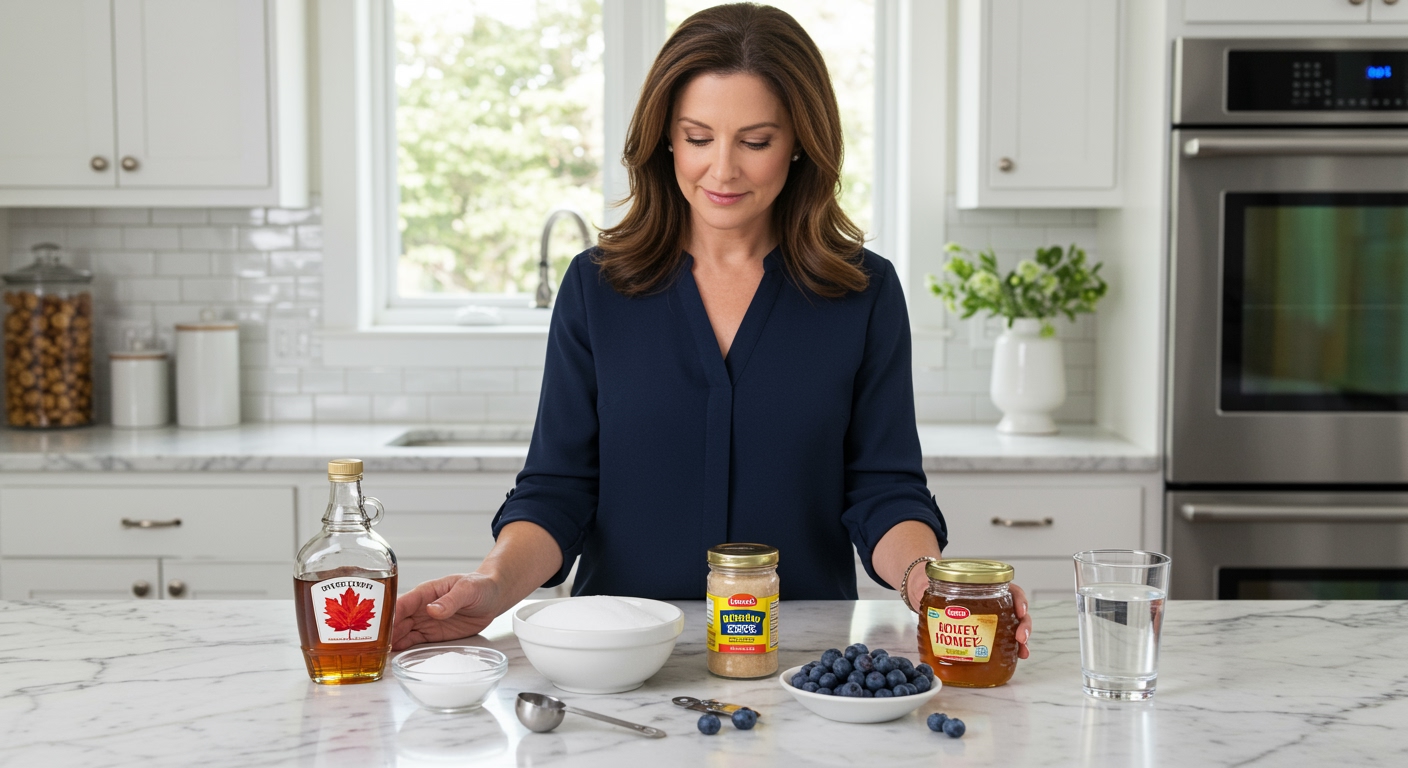✪ Key Takeaway: Maple syrup is not inherently bad for PCOS when consumed in small amounts due to its lower glycemic index and mineral content.
Introduction
You reach for that bottle of maple syrup and suddenly freeze, wondering if this sweet decision will sabotage your PCOS management efforts.
Most women with PCOS have been told to avoid all sweeteners, but this blanket advice often leaves you confused about which options might actually be acceptable in moderation.
Hi, I am Abdur, your nutrition coach, and today I am going to explain whether maple syrup deserves its bad reputation among women managing PCOS.
How Does Maple Syrup Affect Blood Sugar In PCOS?
Maple syrup has a glycemic index of 54, which places it in the moderate category compared to table sugar at 65.
This lower glycemic response means maple syrup causes a slower rise in blood glucose levels than refined white sugar.
Women with PCOS often struggle with insulin resistance, making blood sugar management crucial for symptom control.
The fructose content in maple syrup is about 35%, while the rest consists of sucrose and glucose.
This composition creates a more gradual insulin response compared to high-fructose corn syrup or agave nectar.
However, portion control remains essential because even natural sugars can worsen insulin sensitivity when consumed excessively.
✪ Pro Tip: Limit maple syrup to 1-2 teaspoons per serving to minimize blood sugar spikes.
What Nutrients Does Maple Syrup Provide For PCOS?
Pure maple syrup contains manganese, providing about 22% of your daily needs in just one tablespoon.
Manganese supports antioxidant enzyme function, which helps combat the oxidative stress common in PCOS.
The syrup also provides small amounts of zinc, a mineral crucial for hormone production and insulin function.
Riboflavin and other B vitamins in maple syrup support energy metabolism at the cellular level.
These nutrients make maple syrup a better choice than refined sugar, which provides empty calories without any beneficial compounds.
The antioxidant compounds in maple syrup, including phenolic acids, may help reduce inflammation associated with PCOS.
✪ Fact: Dark maple syrup contains more antioxidants than lighter grades due to longer processing time.
How Should You Use Maple Syrup With PCOS?
Timing your maple syrup consumption around physical activity helps your muscles utilize the glucose more effectively.
Combining maple syrup with protein or healthy fats slows sugar absorption and reduces insulin spikes.
Try drizzling a small amount over Greek yogurt with nuts or adding it to oatmeal with ground flaxseed.
Avoid using maple syrup on an empty stomach, as this creates the most dramatic blood sugar swing.
Consider maple syrup as an occasional treat rather than a daily sweetener to maintain better glucose control.
Monitor your individual response by checking blood sugar levels if you have a glucose meter available.
✪ Note: Always choose 100% pure maple syrup rather than pancake syrup which contains high fructose corn syrup.
What Are Better Sweetener Alternatives For PCOS?
Stevia provides sweetness without affecting blood glucose levels, making it ideal for daily use.
Monk fruit sweetener offers another zero-calorie option that does not trigger insulin release.
Small amounts of raw honey may be preferable to maple syrup due to its antimicrobial properties and slightly lower glycemic impact.
Cinnamon can add natural sweetness while potentially improving insulin sensitivity in women with PCOS.
Fresh or frozen berries provide natural sweetness along with fiber and antioxidants that support hormonal balance.
The goal is finding sweeteners that satisfy your taste preferences without worsening insulin resistance or inflammation.
✪ Pro Tip: Gradually reduce all sweeteners to help reset your taste buds and reduce sugar cravings naturally.
The Bottom Line
Maple syrup is not the villain it is often made out to be for women with PCOS when used mindfully and in moderation.
The key to managing PCOS is not perfection but making consistently better choices that support your long-term health goals.
I would love to hear about your experiences with different sweeteners and how they affect your PCOS symptoms, so please share your thoughts in the comments below.
References
At NutritionCrown, we use quality and credible sources to ensure our content is accurate and trustworthy. Below are the sources referenced in writing this article:





